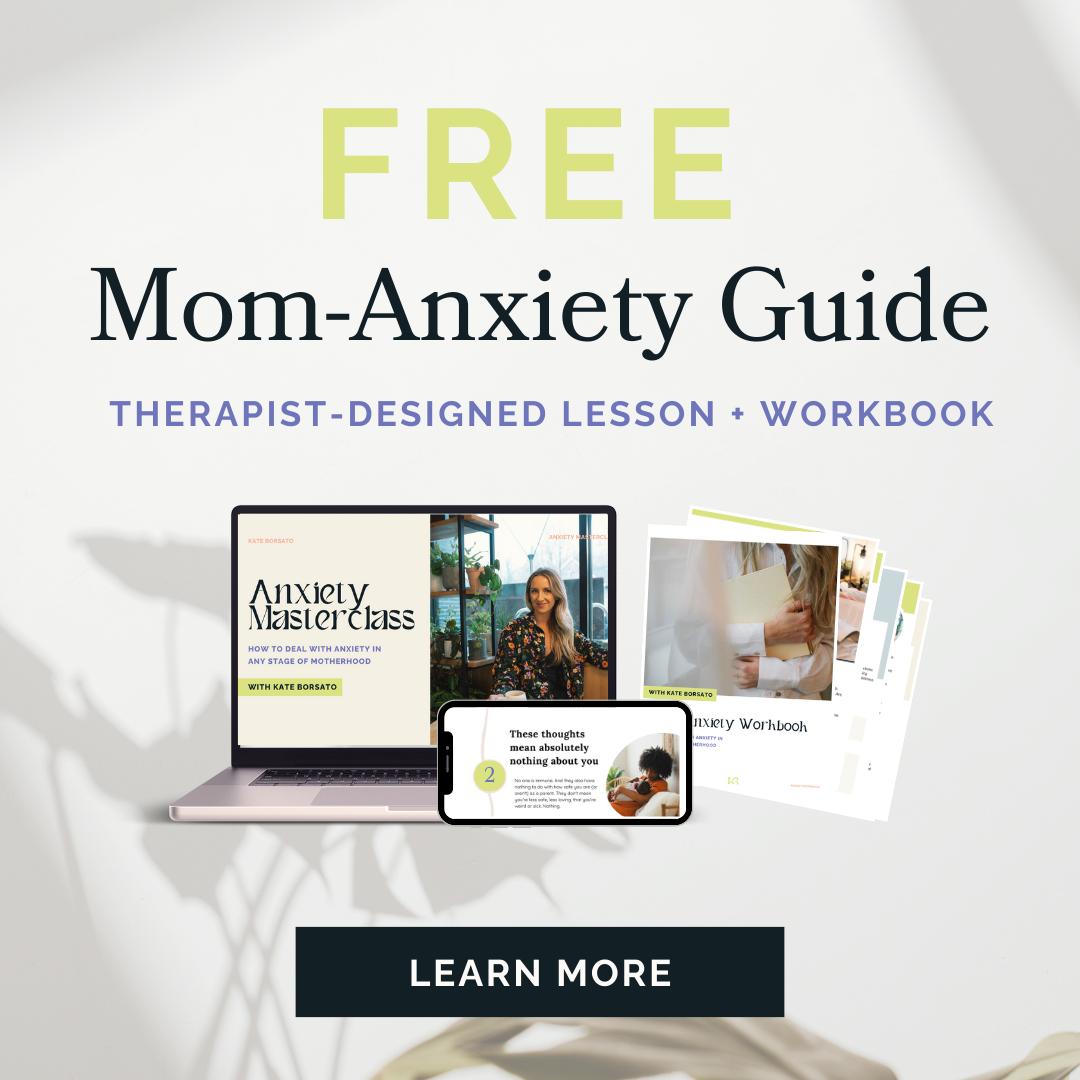Scary or unwanted intrusive thoughts during the postpartum phase is one of the most common reasons why many women seek therapy or mental health support. These scary thoughts in motherhood can really weigh on you and have an impact on your mental wellbeing, mood, and even how you go about your day.
Most of us experience intrusive thoughts at one point or another.
These are the unwelcome, disturbing images that enter your mind seemingly for no reason. You’ve probably experienced this. But what separates normal intrusive thoughts that everyone has, and that are problematic is all about the impairment those thoughts have in your life.
Thoughts are just thoughts, but if those thoughts impact you in significant ways then they are something to pay attention to and get support with.
An example of an intrusive thought could be envisioning a car crash while you’re driving to the supermarket with your children in the back seat. It could also be mentally picturing your child falling down the stairs and breaking her arm. Or, a common one, being somewhere high up like a cliff or the tenth storey of an apartment building and wondering if you’ll jump. You might be nodding along as you’re reading this thinking, “Yup, I’ve totally imagined some of these horrific scenarios!”

Sometimes these thoughts are even violent, or disturbing, and can cause you to question yourself. But regardless of the content of your thoughts, the process to manage them is the same. If you’re alarmed about your thoughts, I want you to know that you’re not weird, or wrong, or a bad mother. The truth is that this happens to most people and it especially happens to mothers postpartum. You can read all about intrusive thoughts here to find out why they happen, what they look like, and what they mean.
For the sake of context though, the really quick explanation is that intrusive thoughts that cause significant distress in your life are a product of anxiety. Your hypervigilant, protective mother brain is on high alert assessing threats and scanning for danger. And sometimes, these thoughts are based in scary scenarios that have either already happened, or could possibly happen in the future (like if your child has a serious medical condition). Your brain is endlessly creative and so any thoughts could become intrusive when they bombard you and cause distress.
What intrusive thoughts sound like
One of the most important things about intrusive thoughts is to recognize them for what they are (intrusive, involuntary, and often meaningless, more on that later.)
You might have a hard time identifying these thoughts for what they are at first. That’s why I’m providing a list of some of the most common intrusive thoughts that I hear from moms all the time.
Please note that I’m naming these in order to normalize the scary thoughts that many moms experience and to help you recognize this common symptom in motherhood so that you can feel less alone and less scared when they pop up. Please take care while reading.
- “My baby is so tiny and vulnerable. What if I drop her? What if I let someone else hold her and they drop her?”
- “My child is signed up to go swimming/rock climbing/on an active school trip. What if there’s an accident?”
- “What if he falls down the stairs?”
- “I hope I don’t inappropriately touch my child while diaper changing.”
- “I could get in a car accident/plane crash/natural disaster and what would happen to my kids?”
- “What would happen if I got diagnosed with a serious illness and died?”
- “There are so many illnesses dominating headlines. What if my child gets sick?”
- “What if the older one plays too rough and hurts the younger one?”
- “Why can’t I stop picturing gruesome dog attacks?”
- My husband works a dangerous job, what if he doesn’t come home?
- My child has a medical condition and I can’t stop worrying about how their life will be.
How can I make intrusive thoughts go away?
This is one of the most asked and most researched questions for mothers who experience intrusive thoughts. This is something that can have a significant impact on your happiness, your mental health, your routine and even your relationships with family. It’s understandable that you may then want to put your focus into stopping the thoughts in their tracks. That makes sense, right? These horrifying mental images are causing distress, why not learn how to prevent them from happening in the first place?
The unfortunate thing is that you can’t actually stop them (not directly, at least). That’s not how the mind works. Focusing on the thoughts in this way is actually putting energy into them and making the problem worse (even though your intentions are the opposite).
Consider this example: If I were to tell you to think about anything other than a green goat, what would happen? In trying not to think about a green goat, you’re probably thinking about only that, right? The same thing goes with intrusive thoughts.
So what do I do then?
In knowing that you can’t really make intrusive thoughts go away, you may feel at a loss when trying to learn how to manage them. The fortunate thing is that there *are* some actions you can take to take their power away and lessen the impact they’re having on your life.
Keep reading to learn about four simple steps which will enable you to start managing this thinking pattern.
1. Name them.
Having a mental image about something awful happening to you, your children, or your partner can feel really devastating. Mindfulness is key here though. When you recognize one of these thoughts as it pops up, try naming it. Even saying out loud, “That’s an intrusive thought,” can help you recognize it for what it is. It’s just a thought, it’s not real, and it’s often not realistic.
2. Don’t make meaning of them.
Our minds can play tricks on us. One of the problems with intrusive thinking is that we can make more meaning of them than necessary. An example of that would be if you have the thought and then you spiral into an anxious cycle afterwards.
That could look like worrying about whether or not the thought was a premonition, wondering if you’re a bad mom, fearing that you’re a danger to your kids, or changing your behaviours in an attempt to prevent the thought from becoming reality. For example, maybe you have a scary thought about your baby falling off the changing table. If you start handing off that task to your partner instead as you yourself avoid it, you’re giving the thought weight and meaning. Instead, try saying, “That’s just an intrusive though and nothing more. This just means I’m feeling anxious these days.”
3. Get proactive with anxiety management.
Since difficult intrusive thoughts are often a product of anxiety, one of the best things you can do is look for ways to reduce stress and anxiety in general. The issue isn’t really whether or not your child falls down the stairs or if you one day get in a car crash.
Take a look at your life and ask how you can manage anxiety better? What self-care strategies can you implement each day? Movement? Calming music? Finding more moments to slow down, and sit in silence with a cup of tea? And what can you take off your plate? Maybe your schedule is too jam-packed or you’re doing the bulk of parenting responsibilities. When you do an assessment of your routine and stressors, you can come up with a plan. If you’re at a loss, here are 10 simple ways that you can manage anxiety every day.
4. Seek support.
Sometimes you just need help! If intrusive thoughts are way too frequent or they’re having a significant impact on your overall well being, reach out to someone for support. Everyone receives support in a different way so think about the strategy that works best for you. Asking a family member to step in with some childcare could make all the difference in easing your anxiety.
Or, set up an appointment with a trusted therapist trained in perinatal mental health who actually *gets it.* If you’re in Canada you could book a counselling session with my team of qualified therapists at The Perinatal Collective.
If you’re more into self-study, free workshop on mom-anxiety would be a really good place to start.









Comments +